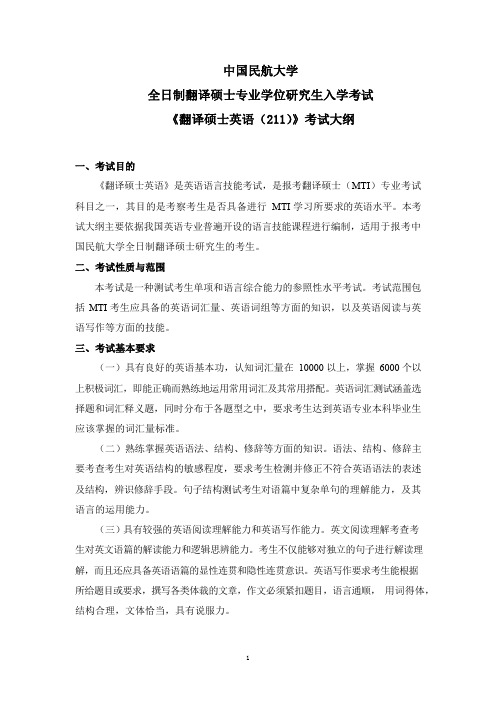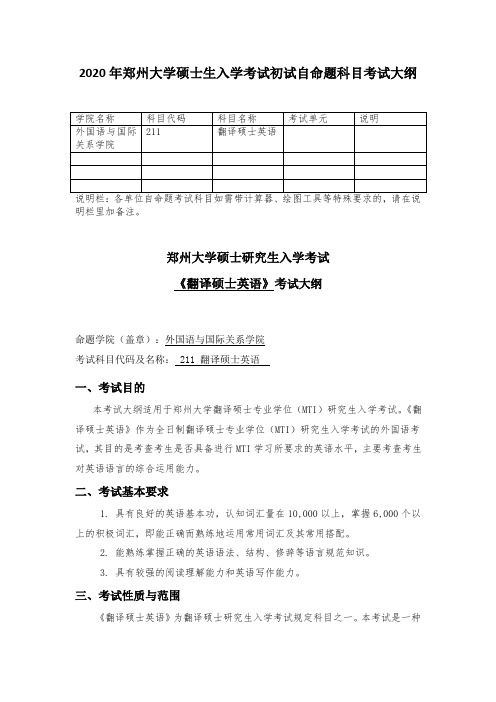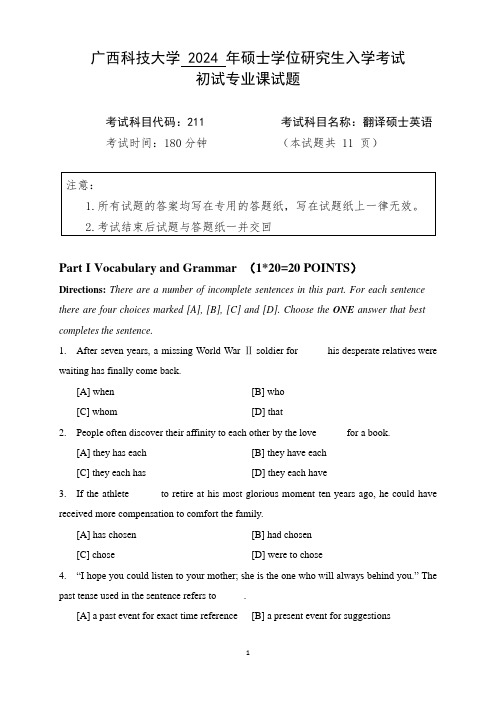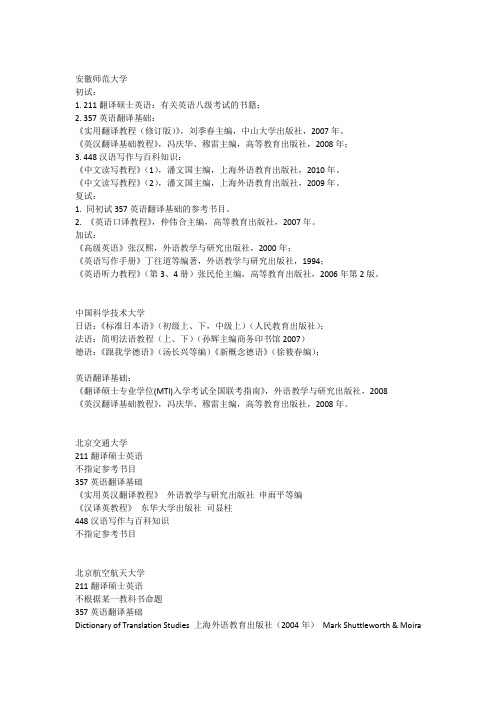211翻译硕士英语
中国民航大学 2024 年研究生招生考试大纲 211翻译硕士英语

中国民航大学全日制翻译硕士专业学位研究生入学考试《翻译硕士英语(211)》考试大纲一、考试目的《翻译硕士英语》是英语语言技能考试,是报考翻译硕士(MTI)专业考试科目之一,其目的是考察考生是否具备进行MTI学习所要求的英语水平。
本考试大纲主要依据我国英语专业普遍开设的语言技能课程进行编制,适用于报考中国民航大学全日制翻译硕士研究生的考生。
二、考试性质与范围本考试是一种测试考生单项和语言综合能力的参照性水平考试。
考试范围包括MTI考生应具备的英语词汇量、英语词组等方面的知识,以及英语阅读与英语写作等方面的技能。
三、考试基本要求(一)具有良好的英语基本功,认知词汇量在10000以上,掌握6000个以上积极词汇,即能正确而熟练地运用常用词汇及其常用搭配。
英语词汇测试涵盖选择题和词汇释义题,同时分布于各题型之中,要求考生达到英语专业本科毕业生应该掌握的词汇量标准。
(二)熟练掌握英语语法、结构、修辞等方面的知识。
语法、结构、修辞主要考查考生对英语结构的敏感程度,要求考生检测并修正不符合英语语法的表述及结构,辨识修辞手段。
句子结构测试考生对语篇中复杂单句的理解能力,及其语言的运用能力。
(三)具有较强的英语阅读理解能力和英语写作能力。
英文阅读理解考查考生对英文语篇的解读能力和逻辑思辨能力。
考生不仅能够对独立的句子进行解读理解,而且还应具备英语语篇的显性连贯和隐性连贯意识。
英语写作要求考生能根据所给题目或要求,撰写各类体裁的文章,作文必须紧扣题目,语言通顺,用词得体,结构合理,文体恰当,具有说服力。
四、考试形式本考试采取客观试题与主观试题相结合、单项技能测试与综合技能测试相结合的方法。
五、考试内容本考试包括以下部分:词汇与词组、阅读理解和外语写作。
总分为100分。
(一)词汇与词组(Part I Vocabulary and Expressions)旨在测试考生对所学词汇和词组、或水平相当的词汇和词组的运用能力。
2020年郑州大学211翻译硕士英语

2020年郑州大学硕士生入学考试初试自命题科目考试大纲明栏里加备注。
郑州大学硕士研究生入学考试《翻译硕士英语》考试大纲命题学院(盖章):外国语与国际关系学院考试科目代码及名称: 211 翻译硕士英语一、考试目的本考试大纲适用于郑州大学翻译硕士专业学位(MTI)研究生入学考试。
《翻译硕士英语》作为全日制翻译硕士专业学位(MTI)研究生入学考试的外国语考试,其目的是考查考生是否具备进行MTI学习所要求的英语水平,主要考查考生对英语语言的综合运用能力。
二、考试基本要求1. 具有良好的英语基本功,认知词汇量在10,000以上,掌握6,000个以上的积极词汇,即能正确而熟练地运用常用词汇及其常用搭配。
2. 能熟练掌握正确的英语语法、结构、修辞等语言规范知识。
3. 具有较强的阅读理解能力和英语写作能力。
三、考试性质与范围《翻译硕士英语》为翻译硕士研究生入学考试规定科目之一。
本考试是一种测试应试者单项和综合语言能力的尺度参照性水平考试,难度依据为英语专业本科高级阶段教学大纲有关要求和我校翻译硕士专业培养目标。
考试范围包括MTI 考生入学应具备的英语词汇量、语法知识以及英语阅读与写作等方面的技能。
四、考试形式和要求本考试采取客观试题与主观试题相结合,单项技能测试与综合技能测试相结合的方法。
考试为闭卷,笔试,考试时间为180分钟,试卷满分为100分。
答案务必书写清楚,必须写在答题纸上,写在试题纸上无效。
五、考试内容本试题包括(但不限于)五个部分:词汇与语法、阅读理解、完形填空、英汉互译和英语写作等。
词汇与语法题型为选择题,主要考察考生熟练运用词汇和语法的能力。
阅读理解题型为选择题或简答题,重点考查通过阅读获取信息的能力、概括与推理能力和语篇综合理解能力,对阅读速度有一定要求。
完形填空考查考生语篇分析推理能力、实际运用语言的能力以及运用语言补全所缺失信息的能力。
英汉互译要求考生运用翻译基本理论和技巧,翻译涉及时政、经济、文化、教育、科技和休闲等方面的段略或文章,译文要忠实原文,词句通顺。
2023年暨南大学全国硕士真题211 翻译硕士英语

_____.
A. confer
B. exclude
C. allot
D. commend
16. The operation could _____ her life by two or three years.
A. prolong
B. increase
C. expand
D. continue
17. The whole country was in _____ over the result of the elections.
A. to start
B. to have started
C. to be starting
D. to have been starting
12. He was here _____ the stroke.
A. in
B. on
C. with
D. to
13. The commission would find itself _____ at every turn if its members couldn't reach an
A. an idiosyncratic B. a heterogeneous C. an inconsequential D. an unorthodox
9. The main thrust of her argument was that wage differences, far from being _____ do in fact
A. By painting them
B. If they would have been painted
C. Were they to be painted
2024年广西科技大学考研真题211+翻译硕士英语

广西科技大学 2024 年硕士学位研究生入学考试初试专业课试题考试科目代码:211 考试科目名称:翻译硕士英语考试时间:180分钟(本试题共 11 页)Part I Vocabulary and Grammar (1*20=20 POINTS)Directions: There are a number of incomplete sentences in this part. For each sentence there are four choices marked [A], [B], [C] and [D]. Choose the ONE answer that best completes the sentence.1. After seven years, a missing World War Ⅱ soldier for _____ his desperate relatives were waiting has finally come back.[A] when [B] who[C] whom [D] that2. People often discover their affinity to each other by the love _____ for a book.[A] they has each [B] they have each[C] they each has [D] they each have3. If the athlete _____ to retire at his most glorious moment ten years ago, he could have received more compensation to comfort the family.[A] has chosen [B] had chosen[C] chose [D] were to chose4. “I hope you could listen to your mother; she is the one wh o will always behind you.” The past tense used in the sentence refers to _____.[A] a past event for exact time reference [B] a present event for suggestions[C] a present event for uncertainty [D] a past event for politeness5. “If you have questions about your health, doctors from nearby clinics will help you.” The word “will” expresses _____.[A] prediction [B] obligation[C] permission [D] willingness6. Although the evidence provided by the police is conclusive, the little boy declared himself _____ innocent.[A] as [B] to[C] be [D] to be7. Not until her ailing girl fell asleep _____ the ward.[A] the tired mother leaves [B] the tired mother left[C] had the tired mother left [D] did the tired mother leave8. There is no reason they should limit how much vitamin you take, _____ they can limit how much water you drink.[A] much harder than [B] as much as[C] any more than [D] no more than9. Such writings are good for nothing _____ the naive, among whom they spread bad influences and foster bad habits.[A] except bluffed [B] except to bluff[C] but to bluffed [D] but bluff10. On September _____ tenth all _____ faculty members of _____ English Department will celebrate _____ Teachers’ Day.[A] the;/;/;the [B] the; the;/;/[C] the; the; the;/ [D] /;the;the;the11. It seems that some computer users have trouble using a touch pad, so if the manufacturers want to be successful, they must design the software in _____ with them as well as with mouse users.[A] pity [B] compassion[C] mercy [D] sympathy12. The laws of Master Sun’s Art of War are meaningless sentences until we know how to _____ them.[A] adopt [B] apply[C] adapt [D] obtain13. In Scotland, as in the rest of the United Kingdom, _____ schooling begins at age 5 and ends at age 6.[A] compulsory [B] forced[C] obliged [D] compelling14. Rescue efforts _____ for fear of another dam breach.[A] assume [B] resume[C] prompt [D] result15. The old carpenter can be angry for no reason at times; my sympathy is for his _____ apprentice.[A] long-suffered [B] long-suffering[C] suffering-long [D] suffered-long16. Believers are _____ under the belief that there are immortal spirits protecting them.[A] firm [B] certain[C] firmly [D] implicitly17. Night follows day as a _____ of natural laws.[A] substitution [B] requirement[C] supplement [D] necessity18. Operations which left patients_____ and in need of long periods of discovery time now leave them feeling relaxed and comfortable.[A] fearful [B] unhealthy[C] upset [D] exhausted19. The_____ of the whole operation has been jeopardized by one careless resident doctor who left a pi ece of gauze in the patient’s body.[A] safety [B] security[C] insecurity [D] protection20. The need for water and soil conservation was recognized during the latter part of the last century, and has been _____ developed in the American continent.[A] excessively [B] exceedingly[C] extensively [D] exclusivelyPart II Cloze (1*10=10 POINTS)Directions: There is one passage in this part. The passage has 10 blanks. For each blank there are four choices marked [A], [B], [C] and [D]. You should decide on the best choice and write it down on the Answer Sheet.The idea that some groups of people may be more intelligent than others is one of those hypotheses that dare not speak its name. But Gregory Cochran is (21) _____ to say it anyway. He is that rare bird, a scientist who works independently of any institution. He helped popularize the idea that some diseases not (22) _____ thought to have a bacterial cause were actually infections, which aroused much controversy when it was first suggested.(23) _____ he, however, might tremble at the thought of what he is about to do. Together with another two scientists, he is publishing a paper which not only (24) _____ that one group of humanity is more intelligent than the others, but explains the process that has brought this about. The group in question are a particular people originated from central Europe. The process is natural selection.This group generally do well in IQ test, (25) _____ 12~15 points above the mean value of 100, and have contributed disproportionately to the intellectual and cultural life of the West, as the (26) _____ of their elites, including several world-renowned scientists, affirm. They also suffer more often than most people from a number of nasty genetic diseases, such as breast cancer. These facts, (27) _____, have previously been thought unrelated. The former has been put down to social effects, such as a strong tradition of valuing education. The latter was seen as a (an) (28) _____ of genetic isolation. Dr. Cochran suggests that the intelligence and diseases are intimately (29) _____. His argument is that the unusual history of these people has subjected them to unique evolutionary pressures that have resulted in this (30) _____ state of affairs.21. [A] selected [B] prepared [C] obliged [D] pleased22. [A] subsequently [B] presently [C] previously [D] lately23. [A] Only [B] So [C] Even [D] Hence24. [A] advises [B] suggests [C] protests [D] objects25. [A] attaining [B] scoring [C] reaching [D] calculating26. [A] missions [B] fortunes [C] interests [D] careers27. [A] moreover [B] therefore [C] however [D] meanwhile28. [A] development [B] origin [C] consequence [D] instrument29. [A] linked [B] integrated [C] woven [D] combined30. [A] paradoxical [B] incompatible [C] inevitable [D] continuousPart III Reading Comprehension (2*10+4*5=40 POINTS)Section ADirections: There are 2 passages in this section. Each passage is followed by some questions. For each of them there are four choices marked [A], [B], [C] and [D]. You should decide on the best choice and write it down on the Answer Sheet.Passage 1This year makes exactly two centuries since the publication of Frankenstein; or The Modern Prometheus, by Mary Shelley. Even before the invention of the electric light bulb, the author produced a remarkable work of speculative fiction that would foreshadow many ethical questions to be raised by technologies yet to come.Today the rapid growth of artificial intelligence (Al) rises fundamental question, “What is intelligence, identity, or consciousness? What makes humans humans?”What is being called artificial general intelligence, machines that would imitate the way humans think, continues to evade scientists. Yet humans remain fascinated by the idea of robots that would look, move, and respond like humans, similar to those recently depicted on popular sci-fi TV series such as “West world” and “Humans”.Just how people think is still far too complex to be understood, let alone reproduced, says David Eagleman, a Stanford University neuroscientist. “We are just in a situation where thereare no good theories explaining what consciousness actually is and how you could ever build a machine to get there.”But that doesn’t mean crucial ethical issues involving AI aren’t at hand. The coming use of autonomous vehicles, for example, poses thorny ethical questions. Human drivers sometimes must make split-second decisions. Their reactions may be a complex combination of instant reflexes, input from past driving experiences, and what their eyes and cars tell them in that moment. AI “vision” today is not nearly as sophisticated as that of humans. And to anticipate every imaginable driving situation is a difficult programming problem.Whenever decision are based on masses of data, “you quickly get into a lot of ethical questions,” notes Tam Kiat How, chief executive of a Singapore-based agency that is helping the government develop a voluntary code for the ethical use of AL Along with Singapore, other governments and mega-corporations are beginning to establish their own guidelines. Britain is setting up a data ethics center. India released its AI ethics strategy this spring.On June 7th Google pledged not to “design or deploy Al”that would cause “overall harm,”or to develop AI-directed weapons or use AI for surveillance that would violate international norms. It also pledged not to deploy AI whose use would violate international laws or human rights.While the statement is vague, it represents one starting point. So does the idea that decision made by AI systems should be explainable, transparent, and fair. To put it another way: How can we make sure that the thinking of intelligent machines reflects humanity’s highest values? Only then will they be useful servants and not Frankenstein’s out-of-control monster.31. Mary Shelley’s novel Frankenstein is mentioned because it __________.[A] the spy phone software requires no special skills or knowledge[B] has remained popular for as long as 200 years[C] involves some concerns raised by AI today[D] has parked serious ethical controversies32. In David Eagleman’s opinion, our current knowledge of consciousness __________.[A] helps explain artificial intelligence[B] can be misleading to robot making[C] inspires popular sci-fi TV series[D] is too limited for us to reproduce it33. The solution to the ethical issues brought by autonomous vehicles __________.[A] can hardly ever be found[B] is still beyond our capacity[C] causes little public concern[D] has aroused much curiosity34. The author’s attitude toward Google’s pledges is one of __________.[A] affirmation[B] skepticism[C] contempt[D] respect35. Which of the following would be the best title for the text?[A] AI’s Future: In the Hands of Tech Giants[B] Frankenstein, the Novel Predicting the Age of AI[C] The Conscience of AI: Complex But Inevitable[D] AI Shall Be Killers Once Out of ControlPassage 2Just how much does the Constitution protect your digital data? The Supreme Court will now consider whether police can search the contents of a mobile phone without a warrant if the phone is on or around a person during an arrest.California has asked the justices to refrain from a sweeping ruling, particularly one that upsets the old assumptions that authorities may search through the possessions of suspects at the time of their arrest. It is hard, the stale argues, for judges to assess the implications of new and rapidly changing technologies.The court would be recklessly modest if it followed Califor nia’s advice. Enough of the implications are discernable, even obvious, so that the justices can and should provideupdated guidelines to police, lawyers and defendants.They should start by discarding California s lame argument that exploring the contents of a smartphone—a vast storehouse of digital information is similar to, say, going through a suspec t’s purse. The court has ruled that police don’t violate the Fourth Amendment when they go through the wallet or pocket-book of an arrestee without a warrant. But exploring one’s smartphone is more like entering his or her home. A smartphone may contain an arrestee’s reading history, finan cial history, medical history and comprehensive records of rec ent correspondence. The development of “c loud computing,” meanwhile, has made that exploration so much easier.Americans should take steps to protect their digital privacy. But keeping sensitive information on these devices is increasingly a requirement of normal life. Citizens still have a right to expect private documents to remain private and prot ected by the Constitution’s prohibition on unreasonable searches.As so often is the case, stating that principle doesn’t ease the challenge of line-drawing. In many cases, it would not be overly burdensome for authorities to obtain a warrant to search through phone con-tents. They could still invalidate Fourth Amendment protections when facing severe, urgent circumstances, such as the threat of immediate harm, and they could take reasonable measures to ensure that phone data are not erased or altered while waiting for a warrant. The court, though, may want to allow room for police to cite situations where they are entitled to more freedom.But the justices should not swallow Californ ia’s argument whole. New disruptive technology sometimes demands novel applications of the Constitution’s protections. Orin Kerr, a law professor, compares the explosion and accessibility of digital information in the 2l st century with the establishment of automobile use as a virtual necessity of life in the 20th: The justices had to specify novel rules for the new personal domain of the passenger car then; they must sort out how the Fourth Amendment applies to digital information now.36. The Super Court will work out whether, during an arrest, it is legitimate to _________.[A] search for suspects’ mobile phones without a warrant[B] prevent suspects from deleting their phone contents[C] check suspects’ phone contents without being authorized[D] prohibit suspects from using their mobile phones37. The author’s attitude toward California’s argument is one of _________.[A] disapproval[B] indifference[C] tolerance[D] cautiousness38. The author believes t hat exploring one’s phone contents in comparable to_________.[A] getting into one’s residence[B] handing one’s historical records[C] scanning one’s correspondences[D] going through one’s wallet39. In Paragraph 5 and 6, the author shows his concern that_________.[A] principles are hard to be clearly expressed[B] the court is giving police less room for action[C] citizens’ privacy is not effective protected[D] phones are used to store sensitive information40. Orin Kerr’s comparison is quoted to indicate that_________.[A] the Constitution should be implemented flexibly.[B] new technology requires reinterpretation of the Constitution[C] California’s argument violates principles of the Constitution[D] principles of the Constitution should never be alteredSection BDirections: Read the following passage carefully and then translate the underlined segments into Chinese.When given the choice to learn how their actions will affect someone else, 40% of people will choose ignorance, often in order to have an excuse to act selfishly, according to research published by the American Psychological Association.(41) “Examples of such willful ignorance abound in everyday life, such as when consumers ignore information about the problematic origins of the products they buy. We wanted to know just how prevalent and how harmful willful ignorance is, as well as why people engage in it.” said lead author Linh Vu, MS, a doctoral candidate at the University of Amsterdam in the Netherlands.The research was published in the journal Psychological Bulletin.Vu and her colleagues conducted a meta-analysis of 22 research studies with a total of 6,531 participants. The studies were all conducted in research labs or online, and most followed a protocol in which some participants were told the consequences of their actions, while others could choose whether to learn the consequences or not.(42) In one example, participants had to decide between receiving a smaller reward ($5) or a larger reward ($6). If they chose $5, then an anonymous peer (or charity) would also receive $5. If they chose the larger $6 reward, however, the other recipient would receive only $1. One set of participants were offered the option to learn the consequences of their choice, while another group was automatically told the consequences.Across the studies, the researchers found that when given an option, 40% of people chose not to learn the consequences of their actions. (43) That willful ignorance was correlated with less altruism(利他主义): People were 15.6 percentage points more likely to be generous to someone else when they were told the consequences of their choice compared with when they were allowed to remain ignorant.The researchers hypothesized that one reason for willful ignorance might be that some people behave altruistically because they want to maintain a positive self-image of being an altruistic person. In those cases, willful ignorance can allow them to maintain that self-image without having to act in an altruistic way.The meta-analysis backed that up, according to study co-author Shaul Shalvi, PhD, a professor of behavioral ethics at the University of Amsterdam. (44) That’s because people who chose to learn the consequences of their action were 7 percentage points more likely to be generous compared with participants who were given information by default. That suggests that truly altruistic people choose to learn the consequences of their actions.“The findings are fascinating as they suggest a lot of the altruistic behaviors we observe are driven by a desire to beh ave as others expect us to,” Shalvi said. “While most people are willing to do the right thing when they are fully informed of the consequences of their actions, this willingness is not always because people care for others. (45) A part of the reasons why people act altruistically is due to societal pressures as well as their desire to view themselves in a good light. Since being righteous is often costly, demanding people to give up their time, money and effort, ignorance offers an easy way out.”All of the studies included in this meta-analysis took place in labs in the United States or Western Europe, or on online platforms such as Amazon Mechanical Turk. Future research should aim to examine willful ignorance in more diverse settings, according to the researchers, and to investigate ways to combat this behavior.Part IV Writing (30 POINTS)Directions:Write a composition on the topic “My Generation’s Views on Work” in about 400 words.You are to write in three parts.In the first part, state clearly what your view is.In the second part, support your view with appropriate reasons.In the last part, bring what you have written to a natural conclusion or a summary.11。
福建师范大学外国语学院《211翻译硕士英语》[专业硕士]历年考研真题及详解
![福建师范大学外国语学院《211翻译硕士英语》[专业硕士]历年考研真题及详解](https://img.taocdn.com/s3/m/370d7326492fb4daa58da0116c175f0e7cd1190c.png)
福建师范大学外国语学院《211翻译硕士英语》[专业硕士]历年考研真题及详解目录封面内容简介目录2010年福建师范大学外国语学院211翻译硕士英语考研真题及详解2011年福建师范大学外国语学院211翻译硕士英语考研真题及详解弘博学习网————各类考试资料全收录内容简介本书收集了福建师范大学外国语学院“211翻译硕士英语[专业硕士]”2010~2011年的考研真题,且所有真题均提供详细的答案解析,真题答案由名校高分研究生整理,解题思路清晰、答案解析准确完整。
历年真题是考研复习备考最好的资料,通过研习历年考研真题,可以了解到考题难度、风格等,为考生复习备考指明了方向。
弘博学习网————各类考试资料全收录2010年福建师范大学外国语学院211翻译硕士英语考研真题及详解I. Vocabulary and grammar (30 points, 1.5 points for each)Multiple choiceDirections: Beneath each sentence there are four words or phrases marked A, B, C and D. Choose the answer that best completes the sentence. Mark your answers on your answer sheet.1.Mr. Smith will _____ resign in view of the complete failure of the research project.A. doubtfullyB. adequatelyC. presumablyD. reasonably【答案】C查看答案【解析】句意:鉴于史密斯先生这次在研究项目上彻底的失败,他很有可能要辞职。
presumably很可能,大概。
doubtfully怀疑地,含糊地。
adequately足够地。
南京大学外国语学院《211翻译硕士英语》[专业硕士]历年考研真题及详解
![南京大学外国语学院《211翻译硕士英语》[专业硕士]历年考研真题及详解](https://img.taocdn.com/s3/m/5055a4015e0e7cd184254b35eefdc8d376ee140a.png)
目 录2010年南京大学211翻译硕士英语考研真题及详解2011年南京大学211翻译硕士英语考研真题及详解2012年南京大学211翻译硕士英语考研真题及详解2013年南京大学211翻译硕士英语考研真题及详解2014年南京大学211翻译硕士英语考研真题及详解2010年南京大学211翻译硕士英语考研真题及详解Part O e: Proof ReadingThe following sentences contain some errors. Copy and edit them on your answer sheet. (1.5×10) 1.An important information I got from her is our teacher’s new marriage.2.She had a lot of difficulty with the long vowel /ei/, so I taught her how to pronounce.3.The tutor asked the pupils: “How to write an essay on your mother?”4.The volleyball players of our department went through very tough training for a whole semester and finally win the championship of the university.5.I felt frustrated and wondered why my English wasn’t improved even after having watched many movies and read many books.6.The news of the H1N1 flu worried the headmaster, but another news was upbeat: so far, everyone in his school was healthy.7.All of us in the class would like to become a teacher in the future.8.In high school, we had to take many classes, Chinese, English, physics, chemistry, mathematics and history and so on.9.The students found it dissatisfied that their hard work was not rewarded or recognized. 10.The university attaches great importance to teacher’s research and publications.【答案与解析】1.An: The(information为不可数名词,因此将An改为The。
211《翻译硕士英语》考试大纲

华中农业大学全日制翻译硕士专业学位研究生入学考试211《翻译硕士英语》考试大纲一、考试目的全日制翻译硕士专业学位(MTI)入学考试科目《翻译硕士英语》的考试目的在于考察考生是否具备进行MTI学习所要求的英语水平。
二、考试性质与范围本考试是一种测试应试者单项和综合语言能力的尺度参照性水平考试。
考试范围包括考生应具备的英语词汇量、语法知识以及英语阅读和写作等各方面的技能。
三、考试基本要求1. 具有良好的英语基本功,认知词汇量在10,000以上,掌握5000以上的积极词汇,即能准确而熟练地运用常用词汇及其常用搭配。
2. 能熟练掌握正确的英语语法、结构、修辞等语言规范知识。
3.具有较强的阅读理解能力和英语写作能力。
四、考试形式本考试采取客观试题与主观试题相结合,单项技能测试与综合技能测试相结合的方法。
各项试题的分布情况参见“考试内容一览表”。
五、考试内容:本考试包括三部分:词汇语法、阅读理解和英语写作。
总分为100分。
I.词汇语法(30分)1. 要求(1)词汇量要求:考生的认知词汇量应不少于10,000,其中积极词汇量在5,000以上,即能准确而熟练地运用常用词汇及其常用搭配。
(2)语法要求:考生能正确运用英语语法、结构、修辞等语言规范知识。
2. 题型:多项选择或改错题II. 阅读理解(40分)1. 要求:(1)能读懂常见英美报刊上的专题文章、历史传记及文学作品等各种文体的文章,能理解其主旨大意,分辨出其中的事实与隐含的观点和意义。
(2)能根据阅读时间要求调整自己的阅读速度。
2. 题型:(1) 多项选择题(包括信息事实性阅读题和观点评判性阅读题)(2) 简答题(根据所阅读的文章,用3-5行字数的有限篇幅扼要回答问题,重点考查阅读综述能力)。
本部分题材广泛,体裁多样,选材体现时代性、实用性;重点考查通过阅读获取信息和理解观点的能力;对阅读速度有一定要求。
III.英语写作1. 要求:根据所给题目及要求撰写一篇400词左右的记叙文、说明文或议论文。
翻译硕士MTI参考书目

广东外语外贸大学 英语笔译、英语口译 复试参考书目 ? 991|翻译实务(笔译):1、《实用翻译教程(修订版)》,刘季春主编,中山大学出版社, 2007 年。 2、《英汉翻译基础教程》,冯庆华、穆雷主编,高等教育出版社,2008 年。 3、《英语口译教程》,仲伟合主编,高等教育出版社,2007 年。 4、《商务英语口译》(第二版),赵军峰主编,高等教育出版社,2009 年。 5、有关英语八级考试的书籍,以及英美政治、经济、文化等方面百科知识的书籍。 ? 992|面试(含口译):1、《实用翻译教程(修订版)》,刘季春主编,中山大学出版社,2007 年。 2、《英汉翻译基础教程》,冯庆华、穆雷主编,高等教育出版社,2008 年。 3、《英语口译教程》,仲伟合主编,高等教育出版社,2007 年。 4、《商务英语口译》(第二版),赵军峰主编,高等教育出版社,2009 年。 5、有关英语八级考试的书籍,以及英美政治、经济、文化等方面百科知识的书籍。
法语口译 复试参考书目 ? 993|翻译实务(笔译):1、《法语》1-4 册, 北京外国语大学法语系马晓宏等编, 外语 教学与研究出版社,1992 年。 2、《法语》5-6 册 ,束景哲主编, 上海外语教育出版社,1991 年。 3、《法语口译实务(2 级)》,陈伟, 外语出版社,2005 年。 4、《法语口译实务(3 级)》,蔡小红, 外语出版社,2005 年。 5、有关法国文学史、法国当代文化方面的书籍。 ? 994|面试(含口译):1、《法语》1-4 册, 北京外国语大学法语系马晓宏等编, 外语教 学与研究出版社,1992 年。 2、《法语》5-6 册 ,束景哲主编, 上海外语教育出版社,1991 年。 3、《法语口译实务(2 级)》,陈伟, 外语出版社,2005 年。 4、《法语口译实务(3 级)》,蔡小红, 外语出版社,2005 年。 5、有关法国文学史、法国当代文化方面的书籍。
- 1、下载文档前请自行甄别文档内容的完整性,平台不提供额外的编辑、内容补充、找答案等附加服务。
- 2、"仅部分预览"的文档,不可在线预览部分如存在完整性等问题,可反馈申请退款(可完整预览的文档不适用该条件!)。
- 3、如文档侵犯您的权益,请联系客服反馈,我们会尽快为您处理(人工客服工作时间:9:00-18:30)。
翻译硕士英语
一、考试目的
《翻译硕士英语》作为全日制翻译硕士专业学位(MTI)研究生入学考试的外国语考试,其目的是考查考生是否具备进行MTI学习所要求的英语水平。
二、考试性质与范围
本考试是一种测试应试者单项和综合语言能力的尺度参照性水平考试。
考试范围包括MTI考生入学应具备的英语词汇量、语法知识以及英语阅读与写作等方面的技能。
三、考试基本要求
1. 具有良好的英语基本功,认知词汇量在10,000以上,掌握6,000个以上的积极词汇,即能正确而熟练地运用常用词汇及其常用搭配。
2. 能熟练掌握正确的英语语法、结构、修辞等语言规范知识。
3. 具有较强的阅读理解能力和英语写作能力。
四、考试形式
本考试采取客观试题与主观试题相结合,单项技能测试与综合技能测试相结合的方法。
各项试题的分布情况见“考试内容一览表”。
五、考试内容
本考试包括三个部分:词汇语法、阅读理解、英语写作。
总分100分。
I.词汇语法
1. 考试要求
1)词汇量要求:考生的认知词汇量应在10,000以上,其中积极词汇量为6,000以上,即能正确而熟练地运用常用词汇及其常用搭配。
2)语法要求:考生能正确运用英语语法、结构、修辞等语言规范知识。
2. 题型
选择题或改错题。
总分30分。
考试时间为60分钟。
II. 阅读理解
1. 考试要求
1)能读懂常见外刊上的专题报道、历史传记及文学作品等各种文体的文章,既能理解其主旨和大意,又能分辨出其中的事实与细节,并能理解其中的观点和隐含意义。
2)能根据阅读时间要求调整自己的阅读速度。
2. 题型
1)选择题(包括信息事实性阅读题和观点评判性阅读题)
2)简答题(要求根据所阅读的文章,用3-5行字数的有限篇幅扼要回答问题,重点考查阅读综述能力)
本部分题材广泛,体裁多样,选材体现时代性、实用性;重点考查通过阅读获取信息和理解观点的能力;对阅读速度有一定要求。
总分40分。
考试时间为60分钟。
III.英语写作
1. 考试要求
考生能根据所给题目及要求撰写一篇400词左右的记叙文、说明文或议论文。
该作文要求语言通顺,用词得体,结构合理,文体恰当。
2. 题型
命题作文,总分30分,考试时间为60分钟。
